
Miscelanea de Estudios Arabes y Hebraicos-Seccion Arabe-Islam
Scope & Guideline
Advancing Knowledge in Arabic and Islamic Heritage
Introduction
Aims and Scopes
- Interdisciplinary Research:
The journal promotes interdisciplinary approaches, integrating history, literature, sociology, and religious studies to explore Arab and Islamic contexts. - Cultural Representation and Identity:
A consistent focus on cultural narratives, particularly around identity formation in Arab societies, including gender, migration, and historical memory. - Historical Analysis:
In-depth historical studies, examining various periods and events significant to Arab and Islamic history, from the medieval era to contemporary issues. - Critical Examination of Modern Issues:
The journal addresses contemporary themes such as political thought, social movements, and cultural expressions within Arab societies, reflecting on their implications in a global context. - Linguistic and Literary Studies:
A strong emphasis on linguistic analysis and literary critique, particularly in Arabic literature, facilitating discussions on semantics, translation, and narrative techniques.
Trending and Emerging
- Gender Studies and Feminism:
An increasing emphasis on gender studies, particularly the exploration of women's roles and contributions in Arab societies, reflects a growing engagement with feminist discourse. - Cultural Memory and Resistance:
Themes surrounding cultural memory, particularly in relation to resistance narratives, are gaining traction, showcasing how historical experiences shape contemporary identities. - Migration and Diaspora Studies:
Research focusing on migration patterns and the experiences of Arab communities in diaspora contexts is emerging, highlighting the complexities of identity and integration. - Intersections of Religion and Politics:
A trend towards examining the interplay between religion and political movements, particularly in the context of modern Islamist thought, indicates a dynamic area of inquiry. - Environmental and Material Culture Studies:
There is a rising interest in the studies of material culture, including the relationship between environment and social practices, which is becoming a significant aspect of cultural analysis.
Declining or Waning
- Traditional Historical Narratives:
There is a noticeable decline in traditional historical narratives that focus solely on chronologies and events without a critical lens, as the journal increasingly favors thematic and interdisciplinary approaches. - Rigid Theological Studies:
Studies centered strictly on theological doctrines without contextual social or cultural analysis have diminished, indicating a move towards more dynamic interpretations of religious texts. - Outdated Linguistic Studies:
Linguistic studies that do not engage with contemporary linguistic theories or sociolinguistic contexts are less frequently published, suggesting a shift towards more relevant and applied linguistic research. - Eurocentric Perspectives:
The journal has moved away from Eurocentric analyses of Arab and Islamic cultures, favoring indigenous perspectives that reflect local contexts and voices. - Historical Fiction and Mythology:
Themes focusing on historical fiction or mythological interpretations without rigorous academic grounding seem to be waning, as the journal prioritizes empirical research and critical scholarship.
Similar Journals
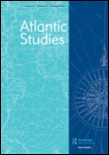
Atlantic Studies-Global Currents
Illuminating the Global Impact of Atlantic CulturesAtlantic Studies: Global Currents is an esteemed journal published by Routledge Journals, Taylor & Francis Ltd, dedicated to the interdisciplinary exploration of the Atlantic region's cultural, historical, and literary narratives. Since its inception in 2010, the journal has established itself as a vital platform for scholars seeking to engage with the complexities of Atlantic Studies, offering a valuable resource that fosters innovative discourse and critical analysis. With its 2023 rankings placing it in the Q1 category in History and Literature, as well as Q2 in Cultural Studies, it is recognized for its substantial contribution to these fields. The journal is highly regarded, boasting impressive Scopus ranks, including a rank of #152 out of 1106 for Literature and Literary Theory, reflecting its significant influence and impact within the academic community. Researchers and students alike will find Atlantic Studies: Global Currents an essential journal that not only disseminates cutting-edge research but also expands the understanding of global currents shaping the Atlantic world today.

Anaquel de Estudios Arabes
Empowering Voices in Arab Linguistics and LiteratureAnaquel de Estudios Arabes is a distinguished academic journal dedicated to the field of Arab studies, offering a platform for original research and critical discussions that span various disciplines. Published by UNIV COMPLUTENSE MADRID, SERVICIO PUBLICACIONES, this journal has established itself as a vital resource since it became Open Access in 2014, facilitating global dissemination of knowledge. With an ISSN of 1130-3964 and E-ISSN 1988-2645, the journal operates from Madrid, Spain, and supports a diverse range of topics related to history, linguistics, literature, and religious studies, earning esteemed Q2 and Q3 rankings in these categories as of 2023. Researchers, professionals, and students alike benefit from the journal's commitment to quality, reflected in its Scopus rankings across several related fields. As it approaches a pivotal period from 2019 to 2024, the Anaquel de Estudios Arabes continues to contribute significantly to the intellectual landscape of Arab studies, engaging scholars who seek to deepen their understanding of the complex cultural and linguistic heritage of the Arab world.
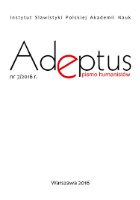
Adeptus
Promoting Accessibility in Slavic Academic DiscourseAdeptus is a pioneering open-access journal published by the Polish Academy of Sciences, Institute of Slavic Studies, specializing in Slavic studies and cultural research. Since its inception in 2014, the journal has aimed to foster scholarly dialogue and advance knowledge across various disciplines related to Slavic languages, literature, history, and sociology. With an ISSN of 2300-0783, Adeptus has positioned itself as a vital resource for researchers, professionals, and students engaged in Slavic studies, offering a platform for high-quality, peer-reviewed articles that explore diverse topics within the field. The journal's open-access model promotes accessibility and dissemination of knowledge, making it a significant contributor to the academic landscape. Located in Warsaw, Poland, Adeptus continues to thrive as a key outlet for innovative research, inviting submissions that embody rigorous scholarship and insightful perspectives.
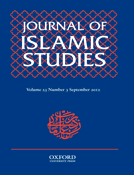
Journal of Islamic Studies
Cultivating a Deeper Understanding of Islamic TraditionsJournal of Islamic Studies, published by Oxford University Press, serves as a pivotal platform for the dissemination of research in the dynamic fields of Islamic culture, history, and literature. With an ISSN of 0955-2340 and an E-ISSN of 1471-6917, this esteemed journal has established itself within the upper echelons of academic scholarship, holding a Q1 ranking in Cultural Studies, History, Literature and Literary Theory, and Religious Studies as of 2023. Its distinguished standing among peers is further evidenced by Scopus rankings that place it within the 97th percentile for Literature and Literary Theory and the 91st percentile for both Religious Studies and History. Aimed at researchers, professionals, and students alike, the journal spans a broad temporal focus from 1990 to 1996 and continues from 2009 to 2024, nurturing vital discourse on Islamic studies without the barrier of open access. With its rich repository of articles, the Journal of Islamic Studies remains an essential source for advancing understanding and scholarship in a rapidly evolving academic landscape.
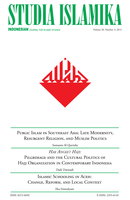
Studia Islamika
Illuminating the intersections of faith, society, and scholarship.Studia Islamika is a distinguished academic journal published by the Syarif Hidayatullah State Islamic University Jakarta, specifically through the Center for Study Islamic & Society. Established in 1994, this journal has rapidly evolved to become a pivotal platform for advancing scholarly dialogue in the field of Islamic Studies. With a notable impact factor and categorized in the prestigious Q2 quartile of Religious Studies as of 2023, it emphasizes the critical examination of Islamic thought, culture, and sociopolitical contexts. The journal's issues span from 1994 to present, featuring innovative research that engages with contemporary challenges in Muslim societies. Although it does not currently offer open access, its rigorous peer-review process ensures high-quality research contributions. Researchers, professionals, and students alike will find Studia Islamika to be an invaluable resource for enhancing their understanding of the multifaceted dynamics within Islamic traditions and their implications in today's world.

Zeitschrift fur Katalanistik
Exploring the Depths of Catalan Language and LiteratureZeitschrift für Katalanistik is a distinguished academic journal published by Albert Ludwig University in Germany, catering to the fields of Linguistics and Literature. With an impressive converged history from 2010 to 2023, this journal operates under rigorous academic scrutiny, as evidenced by its classification in the Q3 quartile for Linguistics and Q2 for Literature and Literary Theory. It holds a respectable ranking in the Scopus database, indicating its solid contribution to ongoing scholarly dialogue, particularly in the realms of both language and literary studies. Despite not currently offering Open Access options, the journal provides a vital platform for researchers, professionals, and students seeking to publish and explore contemporary issues in Katalan studies. With its comprehensive scope and academic rigor, Zeitschrift für Katalanistik remains an essential resource for anyone passionate about the intersection of Catalan language and literature.
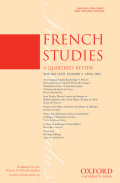
FRENCH STUDIES
Exploring the Depths of French HeritageFRENCH STUDIES is a premier academic journal published by Oxford University Press, dedicated to advancing the fields of Cultural Studies, History, Linguistics, and Literature. Established in 1947, the journal has become a significant platform for interdisciplinary research, reflecting on the complexity and richness of French cultural and literary heritage. With an impact factor that positions it in Quartiles Q2 and Q3 across various categories, including Literature and Literary Theory, FRENCH STUDIES is recognized for its scholarly contributions and insights into historical narratives, linguistic developments, and cultural analyses. The journal does not currently offer open access options, yet it remains an essential resource for researchers, professionals, and students seeking to deepen their understanding of French studies and its global implications. The journal's commitment to quality and intellectual rigor is evidenced through its Scopus rankings, making it a valuable asset for the academic community in the United Kingdom and beyond.
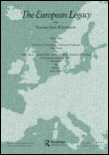
European Legacy-Toward New Paradigms
Charting the Course of Contemporary Cultural StudiesEuropean Legacy-Toward New Paradigms is a distinguished academic journal published by Routledge Journals, Taylor & Francis Ltd, focusing on interdisciplinary approaches to cultural studies, history, and philosophy. With an ISSN of 1084-8770 and an E-ISSN of 1470-1316, this journal has made significant contributions to the understanding of European heritage and its impact on contemporary thought and society since its inception in 2001. It currently holds a Q3 ranking in Cultural Studies, History, and Philosophy, reflecting its relevance and scholarly impact within the academic community. Although not an Open Access journal, European Legacy provides valuable insights and research findings through its carefully curated articles, making it an essential resource for researchers, professionals, and students alike. The journal's commitment to exploring new paradigms fosters critical dialogue and encourages innovative perspectives on Europe’s complex legacies, thereby positioning itself as a vital platform for ongoing academic discourse.

MESTER
Elevating Voices in Cultural Studies and LinguisticsMESTER is a distinguished academic journal published by the UCLA College of Humanities, known for its commitment to advancing research in the fields of Cultural Studies, Linguistics and Language, and Literature and Literary Theory. With an ISSN of 0160-2764, this journal serves as a vital platform for scholars and professionals to disseminate innovative research and critical perspectives from diverse theoretical frameworks and cultural contexts. Although currently operating without an Open Access model, MESTER continues to uphold a rigorous peer-review process, ensuring that published articles maintain high academic standards. Recognized for its selective focus, MESTER holds a Q4 categorization in Cultural Studies and Linguistics, and Q3 in Literature and Literary Theory, situating it as a relevant, if emerging, voice within these disciplines. Housed within the significant repository of knowledge at UCLA, the journal beckons researchers, students, and practitioners to engage with its contributions to the humanities and build upon its foundations in cultural discourse.
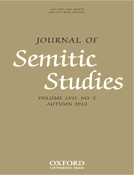
JOURNAL OF SEMITIC STUDIES
Fostering Interdisciplinary Dialogue in Semitic ResearchJOURNAL OF SEMITIC STUDIES, published by Oxford University Press, is a premier academic journal that has served as a vital platform for interdisciplinary research in the fields of Semitic languages, history, culture, and religion since its inception in 1956. With a distinguished impact factor and a significant presence in various academic quartiles, including Q1 rankings in History and Literature, this journal is essential for scholars and practitioners seeking to advance their understanding of Semitic studies. The journal's scope includes comprehensive research articles, critical essays, and reviews that contribute to ongoing dialogues in Cultural Studies, Linguistics, and Religious Studies, making it indispensable for researchers, educators, and students alike. Although it currently does not offer open access, the high-quality, peer-reviewed content ensures rigorous academic standards while maintaining engagement with current trends and discussions in its respective fields. As a hub for innovative and influential scholarship, the JOURNAL OF SEMITIC STUDIES continues to foster an environment that encourages exploration and discovery within the rich tapestry of Semitic languages and cultures.